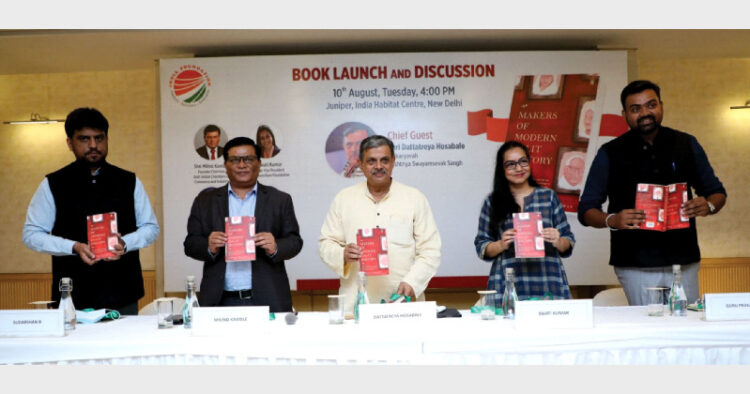“Dalit history and modern history are not two different things”, said RSS Sarkaryavah Shri Dattatreya Hosabale at a book launch of ‘Makers of Modern Dalit History’ in Delhi on August 10.
Speaking at the launch of the book authored by Guru Prakash Paswan and Sudarshan Ramabadran, Shri Hosabale said, “The great personalities (mentioned in the book) are not only the leaders of a particular community or a section of society but we have to declare proudly that they made history of India. They have contributed in the development, social change and transformation of the country”.
Underlining India’s history, Shri Dattatreya Hosabale ji said that without mentioning the contribution of the Dalit community, the political, economic, social, cultural, and spiritual history would be incomplete, dishonest, and untrue”.
Referring to the caste-based reservation as an instrument of affirmative action that has an important role in social justice and equality, RSS Sarkaryavah said that reservation and reconciliation (between communities) have to go hand in hand.
“I and my organisation have been strong supporters of reservation for decades. In 1980 when anti-reservation movement were going on the university campuses, we (ABVP) passed a resolution and organised an all India seminar in Patna about reservation. Time and again we declared that reservation is the historic necessity for many more decades as long as there is inequality being experienced by a particular section and segment of society…It is not anybody is giving them as grace; it is their right to decline or deny the reservation at any point of time in future,” said Shri Hosabale.
RSS Sarkaryavah went on to say that social harmony and social justice were not political strategies but articles of faith for RSS.
On the occasion, he mentioned the second Sarsanghchalak of the Rashtriya Swayamsevak Sangh (RSS) Guruji Golwalkarji’s letter of 1969.
In 1969, a resolution was passed declaring that untouchability has no place in our religion & society and it has no sanctity. Many prominent Shankaracharya and heads of different sects passed the resolution. The purpose of mentioning these things is that society discusses many things but often, who says what is more important. When it comes from the people who have occupied the religious seats from where these things have been interpreted rightly or wrongly in the past…, it will go a long way when they say certain things.
After the resolution was passed, Guruji wrote a letter to an important functionary “the resolution on untouchability which is supported and blessed by all our Acharyas, Dharmacharyas, etc…, all that holds a pious expression merely cannot be played in actual life. Century of old prejudices do not disappear only by superior sense, wishful thinkings and passing by some resolutions. Only hard work and right propagation has to be taken town to town, village to village house to house and people to people; and have to accept and practice what has been resolved. It should not be presented as a dispensation to the pressure of modern times but by abiding principle and way of life in a humble spirit of atonement of our past mistakes”.
While the opponents of the RSS have accused it of opposing caste-based reservation that allows quotas for Scheduled Castes and Scheduled Tribes communities in government jobs and educational institutions, Shri Hosabale reiterated that the RSS has been at the forefront of denouncing casteism.
Addressing the gathering, Shri Millind Kamble, Chairman, Dalit Indian Chamber of Commerce and Industry (DICCI), emphasised the role of SCs and STs in nation-building. He said that Dalits has been the drivers of the rural economy. This section of society has played a significant role in ancient architecture, temple building, and even historical Indian texts.
“Dalits has been the service providers of the society and if we talk about current India’s GDP, this section of society contributes a lot. 80 per cent of the construction industry belongs to Dalit community”, said Kamble.
He appreciated the authors for recognising Dalit Indian Chamber of Commerce and Industry’s work and suggested that authors incorporate more Dalit icons in the book's second edition.
The book “Makers of Modern Dalit History” features several inspirational Dalit leaders like BR Ambedkar, Babu Jagjivan Ram, Gurram Jashuva, Rani Jhalkaribai, Savitribai Phule and many more who tirelessly battled divisive forces all their lives. This book seeks to enhance present-day India’s imagination and shape its perception of the Dalit community.














Comments